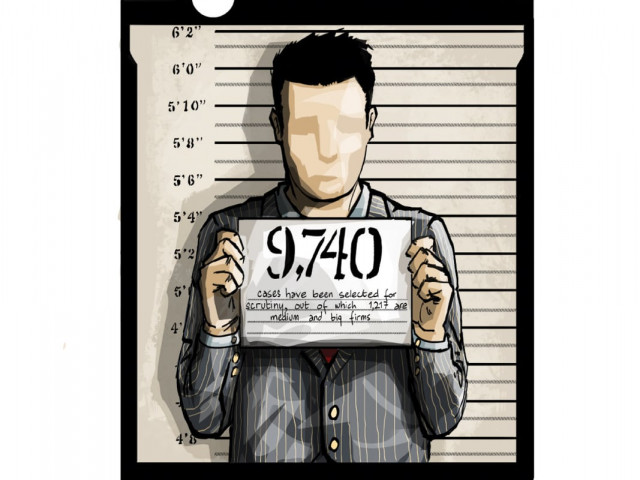FBR isolates 10,000 cases for suspected tax evasion
Federal Board of Revenue to conduct audit of individuals and firms who filed dodgy returns in 2011.

Amid deep-rooted suspicions of massive tax evasion by even those who regularly file income tax returns, the government has selected roughly ten thousand cases for a tax audit. Almost 13% of the entities and persons in the government’s crosshairs are big firms.
The Federal Board of Revenue isolated these cases on Tuesday through parametric computer balloting, making sure that those who are fully discharging their tax liabilities are not unnecessarily pursued, claimed tax officials.
They explained that only those firms that failed to clear the two dozen risk parameters set for the ballot had been selected for the audit, while individuals and associations of persons who did not clear the 20 risk parameters set for the non-corporate sector had been isolated for audit purposes.
A total of 9,740 cases have been selected for scrutiny, out of which 1,217 are medium and big firms, according to the Federal Board of Revenue (FBR). The rest of the 8,523 cases isolated belong to the non-corporate sector. The salaried class has been excluded from the exercise.
For big firms, one criterion defined for the selection was that the companies’ opening balance sheets in a new year did not match the closing balance sheet of the previous year. Another criterion was firms which claimed more than Rs10 million in refunds, which tax officials have deemed ‘suspicious’ activity.
The FBR has held the computerised ballot after a gap of three years. In 2009, it had picked over 900 firms and individuals for the audit, but many of them obtained stay orders from courts against the decision. The petitioners had claimed that under the self assessment scheme of the FBR, taxpayers were the ultimate authority on determining the taxable amount, and the FBR therefore did not have any role.
After that experience, the FBR has amended its laws and inserted Clause 214-C in the Income Tax Ordinance, which empowers the FBR to conduct an audit of taxpayers. In addition, officials said that the risk parameters defined for the selection were also finalised after consultation with tax bar associations.
The audit will be performed only for tax year 2011. In that year, the FBR had received a total of 1.45 million returns, including those from the salaried class. Out of that figure, returns filed by the corporate sector totalled 22,204, returns filed by the non-corporate sector totalled 519,974. For the audit exercise, the FBR ran the data for 448,866 taxpayers through its parametrised ballot, out of which 9,743 cases were selected.
The taxes paid that year with filed returns were dismally low as compared to previous years, compelling the authorities to go for the audit, said officials. The exercise should otherwise be a regular feature to deter taxpayers from evading taxes, they added.
The FBR is also working on an amnesty scheme to encourage over three million identified persons to file income tax returns and pay due taxes.
FBR Taxpayers Audit Member Mustafa Ashraf said that the FBR had reposed confidence in taxpayers through the self assessment scheme, but certain people did injustice to that responsibility by either not paying taxes, or paying less than their due share.
The selection of approximately 15% of returns filed by large taxpayers units, 5% of returns filed by corporate entities, and 2% of returns filed by non-corporate taxpayers in Regional Tax Offices is only to promote voluntary compliance, he added.
The maximum number of audit cases – 2,063 – have been picked from the jurisdiction of Lahore’s tax offices; followed by Karachi, from where 1,909 firms and individuals have been picked for the probe. From Islamabad, 308 cases have been selected for the audit, according to the FBR. The FBR has also placed the list of the audit cases on its website.
Published in The Express Tribune, November 14th, 2012.


















COMMENTS
Comments are moderated and generally will be posted if they are on-topic and not abusive.
For more information, please see our Comments FAQ